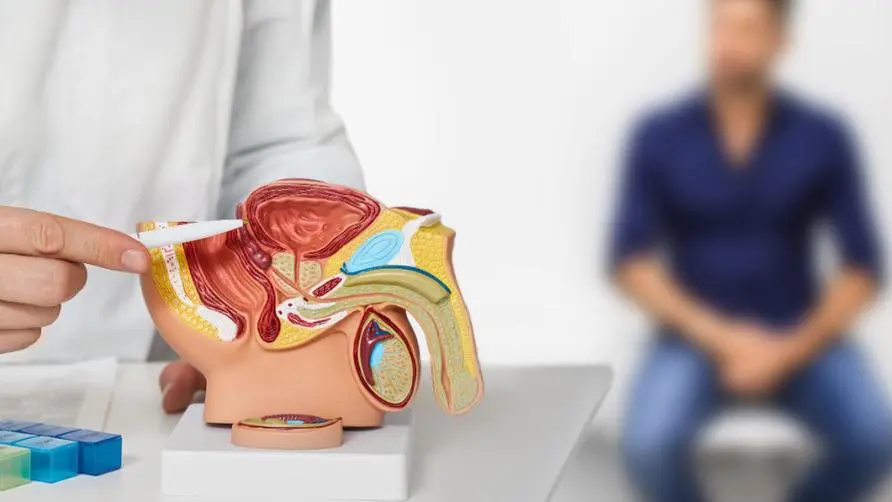In Taiwan, 30% of prostate cancer cases metastasize after diagnosis, three times more than in Europe and the United States! Doctor: People over 50 should have their PSA checked regularly

Late-stage prostate cancer diagnosis in Taiwan is nearly three times higher than in European and American countries
Taiwanese cancer registration data in 2021 show that the number of new cases of prostate cancer reached 7,481, not only ranking 5th among the top ten cancers in men, but also ranking 6th in the mortality rate. Dr. Feng Sizhong, chairman of the Taiwan Urology Association, said that prostate cancer is one of the most common cancers in elderly men, and the number of cases has increased by nearly 4%. As Taiwan will enter a super-aged society in 2025, Prostate cancer numbers are expected to continue to rise. In addition to directly causing patient deaths, the health care costs of prostate cancer are also an important issue.
“There are more than 7,000 new cases of prostate cancer in Taiwan every year, of which nearly 30% have “metastatic” prostate cancer when diagnosed, while the proportion in European and American countries is less than 10%, resulting in more The patient needs back-line treatment!”
Dr. Huang Zhaoyuan, chairman of the Urological Oncology Committee of the Taiwan Urological Medical Association, pointed out that prostate cancer is difficult to detect in its early stages. Patients may experience symptoms such as difficulty in urination, blood in urine or semen, painful ejaculation, frequent urination at night, bone pain, and increased PSA index. Common symptoms of prostate cancer may be metastatic prostate cancer. Most first-line treatments for metastatic prostate cancer are hormonal therapy. However, drug resistance usually develops after several years of treatment and develops into “metastatic castration-resistant prostate cancer”, with even worse prognosis and mortality. .
Having a BRCA gene mutation increases the risk of prostate cancer by 1.9 times
Dr. Huang Zhaoyuan said that prostate cancer mostly occurs in men over 50 years old, with the median age of incidence being 72 years old. The cause of the disease is currently unknown and is related to the history of symptoms in family members. If the father or brother is a prostate cancer patient, , individuals are at greater risk of developing prostate cancer. In addition, studies have shown that bad lifestyle habits, such as smoking, high-fat or high-cholesterol eating habits, are also risk factors for prostate cancer.
In addition, prostate cancer has also been found to be related to gene mutations. About 12% of metastatic prostate cancers have BRCA gene mutations, especially those with a family history of cancer. Studies have found that people with BRCA gene mutations are more likely to suffer from prostate cancer. The risk of prostate cancer is 1.9 times that of the general population.
“In order to detect prostate cancer early, men over 50 years old should regularly draw blood to test PSA values. For example, we encourage the public to understand their cholesterol, triglyceride and kidney function numbers. Through regular PSA testing and tracking, they can Help prostate cancer be diagnosed early and receive appropriate treatment!”
Dr. Huang Zhaoyuan pointed out that men over 50 years old can go to the urology department for regular blood prostate cancer-specific antigen (PSA) tests every six months, and receive digital anal examination as needed. Those with high suspicion can undergo ultrasound imaging to improve early detection. Chances of prostate cancer.
Is hormonal resistance inevitable? Prostate cancer moves toward precision treatment
The treatment of prostate cancer will be based on the stage of the cancer and the patient’s physical condition. Dr. Kuo Wei-ting from the Department of Urology, Kaohsiung Veterans General Hospital said that most first-time treatments for prostate cancer are based on hormonal therapy. In terms of stage, early-stage prostate cancer has the opportunity to receive surgical treatment or radiotherapy; once it progresses to the advanced stage, chemotherapy, targeted therapy and new generation hormone therapy (new androgen inhibitor therapy) are mainly considered. However, most prostate cancers develop “drug resistance” after hormonal treatment.
“If prostate cancer patients receive hormonal treatment, they will eventually become hormonally resistant, that is, develop into “castrate-resistant” prostate cancer, causing bone pain, abdominal pain and other symptoms, and the subsequent treatment response will also change. Worse!”
Dr. Kuo Wei-ting pointed out that prostate cancer is prone to develop drug resistance after undergoing hormonal treatment and develop into “castrate-resistant prostate cancer.” Studies have shown that the use of PARP inhibitors in patients with BRCA1/2 gene mutations who have deteriorated after a new generation of hormone therapy can reduce the risk of disease death by nearly 40%, and is also helpful in the period when the disease does not worsen. Although health insurance was expanded in November Benefits are provided, but those with metastatic castration-resistant cancer who do not meet the application conditions or do not have relevant gene mutations and are willing to receive treatment must use it at their own expense.
Dr. Guo Weiting called on the current treatment methods for prostate cancer to be diverse and complex, including the patient’s physical condition, whether there is a genetic mutation, and whether the cancer has metastasized or progressed to “castration resistance”. Patients should contact a urologist. Full discussion. As cancer medicine enters the era of precision treatment, elderly and advanced prostate cancer patients may consider early genetic testing and adopt treatment strategies that are more conducive to improving prognosis.
Further reading:





